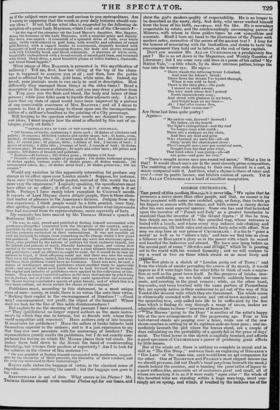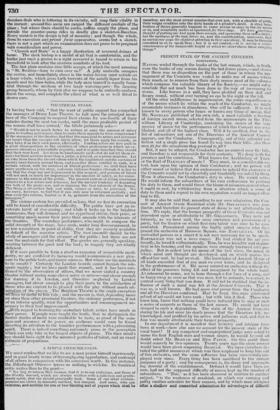GEORGE CRUIKSHANK. iAin 1; never We opine that he possesses
a nerve more than other people, and that, no sooner is his brain pregnant with some new crotchet, quip, or fancy, than twitch go his fingers in unison with the image, and forth comes a dainty device after his own most especial manner. Some one has said that helooked upon the inventor of "Punch and Judy" as a greater benefactor to mankind than the inventor of "the Grand Opera :" if this be true, how deeply are we indebted to this pencilled wag, whose entrance is hailed with a laugh, and whose every step induces side-shaking and muscle-moving, till both sides and muscles fairly ache with effort. Nor may we stop here in our praise of CRUIKSHANK : it is his to "point a moral" as well as to "adorn a tale," and here we find him as close a follower in HOGARTH'S glory as in the power with which he seized. and handled the ludicrous and absurd. We have now lying. before us . the. secoiul part of some " Sketches and S-C.T.aTs 'Ala lie is pouring out to the world with his wonted fecundity ; and We will venture to Say a word or two on those which struck us as most lively and osit„inaL., The first plate is a sketch of "London going out of Town ;" and 'from the clouds of smoke pervading the course of its march, it would appear as if it were high time for other folks to think of such a migra- tion as well as the great town itself. In this progress of bricks, mor- tar, and scaffolding, we see hods and trowels suddenly become ani- mate, and assisting in the great remove ; while, on the other hand, hay-cocks, and trees touched with the same portion of Promethean fire, are equally active in their endeavour to get out of the way of this Vandal-like descent with which they are threatened. The whole scene is whimsically crowded with in-town and out-of-town incidents ; and the sprawling tree, only called into life to be suffocated by the fine lime which is finding its way through a range of sieves, makes an admirable climax to these "miseries of human life."
--'reThe Horses going to the Dogs'" is another of the artist's happy hits at the new arrangements of this progressing age. Four or five half-starved steeds are peeping over a fence, while one of the new steam-coaches is rattling by at its eighteen-mile-an-hour pace ; and im- mediately beneath the plot where the horses stand, are a couple of dogs calculating on the probability of a speedy fall in the price of dogs' meat. The blind horse in this sketch is capitally touched, and affords a good specimen of CRUIKSHANK'S power of producing .great effects by little means. But of the whole set, there is nothing so complete in moral and in skill as "The Gin Shop ;" and were there an engraving of HOGARTH'S "Gin Lane" of the same size, each would form an apt companion for the other. One of THOMPSON and FEARON'S most elegant misses (as we should presume, did not Death's head peep from beneath the mask,) stands behind the counter, and is handing the penn'orths of liquor to a most ruffian-like, miserable set of customers great and small, all of whom are sucking it in as if it were really "aqua vita :" the whole of this besotted tribe are standing within a huge man-trap, most cun- ningly set on spring, and which, if touched by the luckless toe of the drunken drab who is tottering in its vicinity, will snap their vitality in the instant : around this scene are ranged the different cordials of the pla,ee ; but where there should be casks, coffins supply the place, and astride the counter-pump rides in deadly glee a skeleton-Bacchus. Every scratch in the design is full of meaning; and though the whole, from its execution and prima fade appearahce, seems but a sketch, there is not a part which on examination does not prove to be pregnant with consideration and power.
"Church and State" is a happy illustration of reverend doings at home. The sleek bishop is a model of all that is comfortable, and the butler just such a genius as a right reverend is bound to retain in his household to look after the creature comforts of his lord.
The last plate contains nine little scraps, of which the most amusing is"St. Swithin—long to rain over us !" A jolly umbrella occupies the centre, and immediately above is the water-loving saint astride on a huge whale, which gives forth torrents of the saintly liquor from his mouth and his blow-holes, while the holy man himself is equally boun- tiful through the medium of two large watering-pots I he dancing group beneath, whom by their glee we suppose to be umbrella-makers, finish the scrap, and complete the effect of what is so well fitted to drown care.



















 Previous page
Previous page